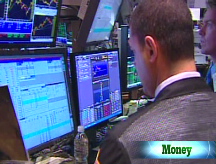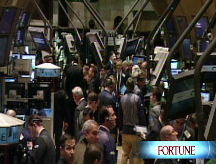Not all dividends are at risk
Many banks are cutting their dividends to hang on to capital. But there are still companies in other industries that are increasing their payouts to investors.
NEW YORK (CNNMoney.com) -- A significant number of companies are slashing dividends to preserve cash.
Comerica (CMA) announced this week that it was reducing its quarterly payout from 33 cents a share to 5 cents a share, making it the tenth S&P 500 company to either cut or suspend its dividend so far this month. Of those 10, eight of the firms are in the financial-services sector.
And while the dividend cuts are probably the right move for these struggling companies, it does hurt investors that have come to depend on income in these wildly uncertain times.
With the market down sharply again so far this year, most investors are probably looking to park their money in stocks or bonds that will provide them a steady stream of cash.
Usually in a period of such tumult. Treasury bonds are a good place to hide. But with the Federal Reserve already lowering interest rates to near zero last month -- and widely expected to leave them there Wednesday afternoon -- Treasurys don't offer investors much in the way of income. The yield on the 10-year Treasury is currently about 2.5%.
So what's someone that wants a decent yield to do? Well, there actually still are some stocks that continue to not just pay, but have been raising, their dividends -- even in this terrible environment.
"On average, stocks pay a higher yield today than do bonds. That is a very unusual occurrence," said Harlan Platt, a finance professor at Northeastern University's College of Business Administration in Boston.
Lost in the hubub about all the banks cutting dividends -- as well as drugmaker Pfizer's (PFE, Fortune 500) surprising move to halve its payout Monday in the wake of its blockbuster deal to buy rival Wyeth -- is that more S&P 500 companies have actually raised their dividends than cut them so far this month.
According to Howard Silverblatt, senior index analyst with Standard & Poor's, 13 companies in the benchmark index have boosted their payout through the morning of Jan. 28.
The list includes several industrial firms, such as railroad company Norfolk Southern (NSC, Fortune 500) and construction supplies maker Fastenal (FAST), and a bunch of utilities, such as CMS Energy (CMS, Fortune 500) and Consolidated Edison (ED, Fortune 500).
But there are even companies in beaten-down sectors like banking, retail and autos that have increased their dividends this month: Hudson City Bancorp (HCBK)., Family Dollar Stores (FDO, Fortune 500) and Genuine Parts (GPC, Fortune 500).
"We are finding some companies with a high yield that are making enough money to pay out their dividend this year," said Silverblatt. "It's not easy to find them but a good place to start is companies with a track record of paying dividends with sufficient cash flow to support the business. Cash flow is key here."
James Denney, portfolio manager with Mohawk Asset Management, an institutional investment firm in Schenectady, N.Y., that focuses on value stocks, shares that assessment. "You have to look at the sustainability of the dividend, and the company's history of prudently increasing them," he said.
With that in mind, he said five quality companies that he thinks will continue to raise their dividends for the foreseeable future are Microsoft (MSFT, Fortune 500), food services company Sysco (SYY, Fortune 500), corporate uniform provider Cintas (CTAS), packaging firm Bemis (BMS) and coating manufacturer PPG (PPG, Fortune 500).
Of course, more companies will probably be paring their dividends in the near-future. So it would not be a surprise if the number of dividend cutters in the S&P 500 soon exceeds the number of firms increasing their dividends sometime soon.
"There are a lot of companies out there under financial stress. And it will get worse before it gets better," Silverblatt warned.
But Silverblatt added that companies that have had a history of annually boosting their dividends and can afford to increase them should definitely keep doing so. Otherwise, the market may start to worry if the company has cash problems.
"If you've been increasing your dividend every year for 10 years in a row, you're almost forced to do so. If not you're putting up a sign on your front lawn saying, 'We have a liquidity problem. Call up the short sellers,' " he said.
Still, Platt points out that it's not a smart move for all companies to maintain lofty dividend yields.
Platt said that companies with extremely high dividend yields are being told by the market that their dividend is probably too rich and should be cut. Keep in mind, a dividend yield is a company's annual dividend divided by its stock price -- so a company with a high yield may only have it because its stock has plunged.
"Some massive companies may need to reduce their dividends not so much to retain capital but simply because they don't need to pay their shareholders extraordinary returns," he said. "A company with a high yield is a company at risk to reduce it since the market is suggesting they are overpaying."
Platt said that a company like Family Dollar, which now pays a dividend that yields 2%, probably has a safer yield than General Electric (GE, Fortune 500), which yields more than 10%.
That's because GE's stock price is nearly two-thirds below its 52-week high while Family Dollar's stock has held up well during the downturn.
"Family Dollar is using their dividend change as a signal to the investing world that they've done well and will continue to do well," Platt said.
So keep that in mind if you're looking at stocks that pay dividends. You don't want a puny yield. But too big of a yield is probably a warning sign as well. Denney points out that, with a few exceptions, companies with a yield above 8% are probably risky. ![]()




